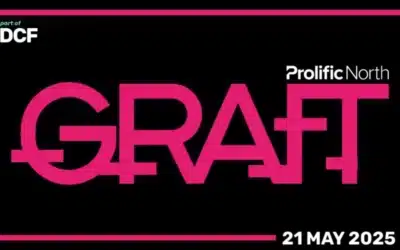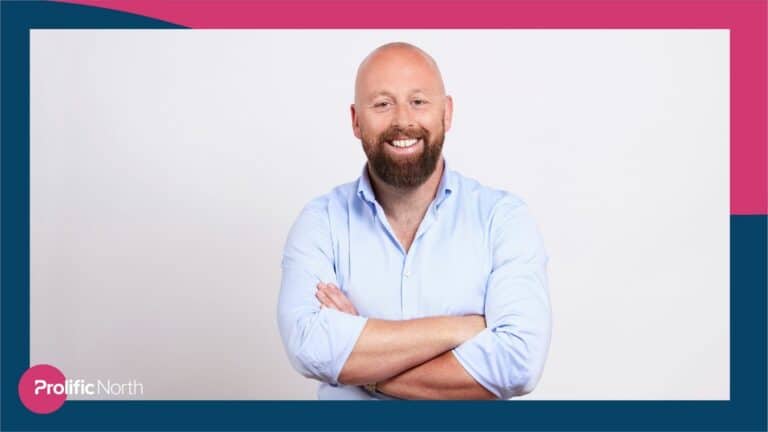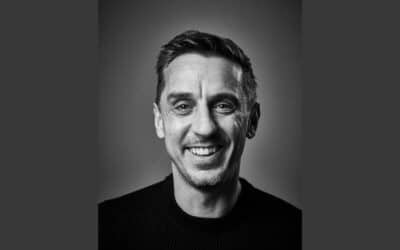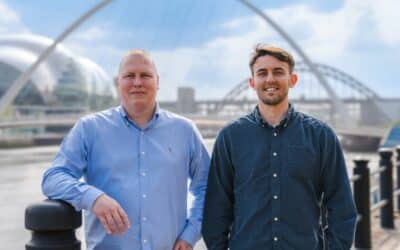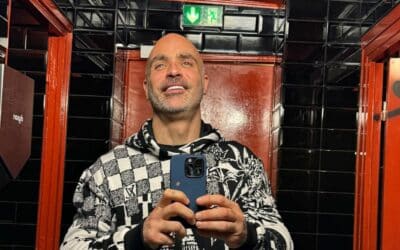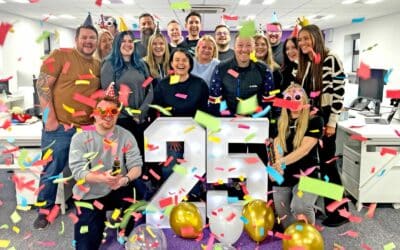When Sam Burgess pitches to investors, he doesn’t mince his words.
“Just to be clear, this is a two-way interview,” he explains during those conversations. “I’m not here with a begging bowl.”
The straight-talking Manchester tech founder and CEO of Partful has built his company with military precision as a former army operator, and he isn’t afraid to shake-up how things are typically done in the world of venture capital either.
GET INVOLVED: Everything you need to know about our GRAFT event in May
“There’s definitely a cultural difference between London-based venture capital firms and Northern-based VCs. That is definitely my experience,” he tells Prolific North.
From the age of just 16, Burgess spent years carrying out machinery maintenance and repairs in the British Army but became increasingly frustrated with out-of-date and often complex manuals and parts catalogues.
In response, he launched Partful in 2017, then known as SamsonVT. The immersive solution now takes data and up-to-date, visual product instructions to create an instant 3D view of parts and equipment.
It might be a business that’s proudly founded in Manchester but Partful’s early scaling journey was anything but smooth.
“We received our first funding right at the start of COVID in 2020 and we were in the middle of recruiting a team. That brought a whole bunch of challenges! I don’t think we actually met in person until August of that year, between the two lockdowns, as a team.
“Then we went back into lockdown again,” he reflects.
READ MORE: How Northern tech is “grafting” its way to the top with global ambitions
While it may have been a “disaster” for many, Burgess says he made the right hires at the right time.
“We bagged a number of ex-contractors who lost their jobs before the whole job market went crazy. 8 to 12 months into it, a junior developer was suddenly on £80k. From a scaling perspective, we were just really smart with the hires that we made.”
But up until a rebrand in 2023, the business was originally launched as ‘Samson VT’.
“The name was a bit of a mouthful. When we were doing calls, as soon as we said ‘Samson VT’ people were repeating it back to us with lots of names that weren’t applicable to us,” says Burgess.
“During those initial calls you have around 30 seconds to make an impression, so when you’re spending the first 15 explaining the name, it’s clear it wasn’t landing.”
After struggling to find something that stuck, inspiration eventually came from a member of the sales team.
“I was sitting in the office one night and I’d almost given up on what the name should be. Danny, our sales guy at the time, was on calls repeatedly saying the words ‘parts order’ and ‘fulfilment’ during conversations.
“I was taking notes as he was talking and it made sense to fuse the two together.”
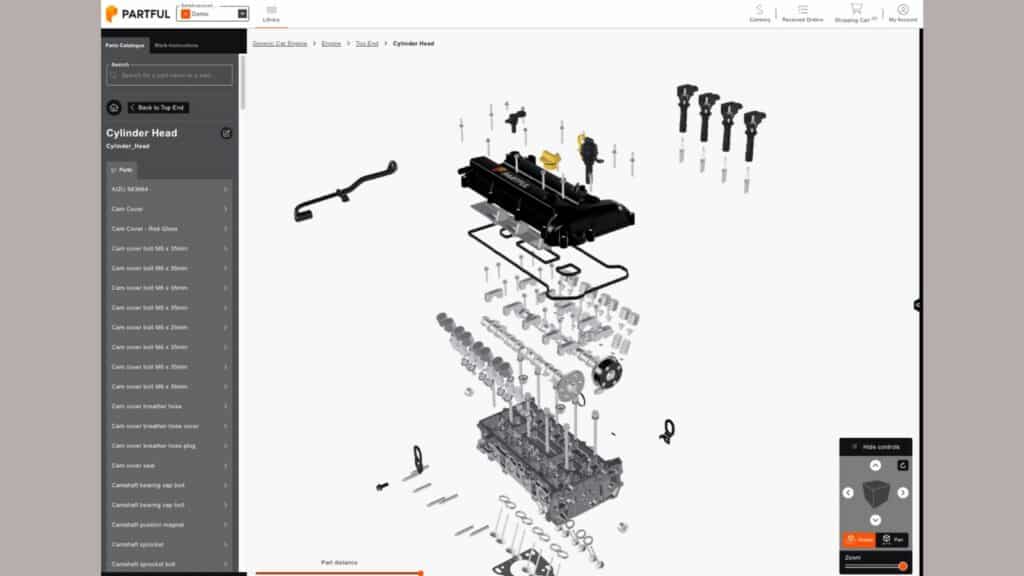
“It’s all about trust”
The business has since raised £11.2 million, including £5 million following a recent investment round in 2024.
On funding, Burgess is clear that location and relationship-building is what matters most especially when it comes to working closely with investors.
“It’s all about what is the value of a VC? Some people might just want the cash, or the experts who have been there before. If it’s a transactional investor, it doesn’t matter where they’re based if it’s just cash you need.
“If you want to lean on your investors, who will then form part of your board and maybe become advisors, having a local connection is really important because relationships are such a critical component as it’s all about trust.”
READ MORE: Inside the Northern tech scene and the investors betting big outside London
Building that trust over a single, monthly phone call might be tough, so his approach is all about fostering long-term relationships with his investors.
“We make a real point of getting together, at least once a year. Two months ago, we had our American investors over for a few days to meet the team.”
With Northern Gritstone’s Manchester offices nearby and Par Equity’s Mark Robinson frequently dropping by, proximity has played a big role in the company’s growth strategy.
“I was really open with our investors from the start that it was a two-way interview,” he explains.
“I’m here to build a business and I want to make sure through any conversations that they are aligned on that. It’s an interesting, but really important dynamic change that you need to get in really early on otherwise you might end up with people you don’t want to work with. For me, I believe that’s a recipe for disaster!”
And Burgess has plenty of thoughts on what Manchester’s tech scene needs to evolve, especially when it comes to events.
“Sometimes it will be 80% recruiters at a networking event, with around 20% being founders. You’re being sold to all the time and I get no value from that.”
READ MORE: “Our future is in America” reveals Northern tech founder behind student rental platform Housr
Instead, he would like to see more peer-led spaces where CEOs and founders can connect and share their battle scars and honest stories in a confidential forum.
“It would be great where we could talk openly and just have those honest conversations, because we can get pretty lonely at times. Sometimes you just need to speak to somebody and ask: ‘am I losing my absolute marbles right now?’ but speaking to them in confidence, knowing they’re not going to try and sell you anything or gain anything.
“We could collectively get together and share our stories. I personally think from an ecosystem viewpoint, that it would be more beneficial to have a CEO ecosystem over anything else.”
Talent, perseverance, adversity: What’s next?
“It can be really hard as a founder”, Burgess admits. “People talk about perseverance, and you’ve got to persevere. You need to constantly make sure there’s product market fit, the technology is there, staff recruitment, everything comes at you continuously.”
With a growing team of 40, the pressure to keep attracting talent while retaining team culture is constant.
“It’s hard. You’ve got to find good people that buy into your vision. Then you need to align those people into a team and nurture them through the journey with you all while trying to figure out product market fit.
“You’re always going to be recruiting, certainly with devs who tend to stay in jobs up to two to three years. You’ve got to continuously make yourself appealing to new people. We might not have the same budget as the likes of HSBC or Barclays, but we more than make up for it by offering a dynamic, empowering place to work.”
On the recent increase in employer National Insurance contributions and the rise in the National Living Wage for workers aged 21 and over, he says it’s not “welcome news” but it’s just another “challenge” for founders.
READ MORE: Is a ‘start-up mentality’ in the UK holding back potential billion-dollar businesses in the North?
“It’s another wave in the ocean that you’ve just got to get used to. I don’t dwell on these things because I’ve got more waves!”
And while global tech roles may be thin on the ground regionally, he says Manchester has the people Partful needs right now: “Where we are within our journey, those resources are in abundance within the North West.”
But is it tougher being a founder in the North?
“The challenges are the same regardless of where you’re from. I don’t buy into the ‘we’re poor’ and ‘we’re worse off up in the North’ statements. You have to go after the opportunities. There are advantages to living, working and setting up a business in London but equally, it means you’ve got to live in London!”
From his conservatory in Macclesfield, Burgess points out to his garden on a sunny spring day.
“I wouldn’t have a backdrop like that if I was living in London – that’s not my salary anyway! I can disappear into the Peak District when the day job is done.”
As for what’s next, the company is preparing to soft-launch Partful 2.0, where users can build an immersive 3D showcase of their products and parts.
“We’re providing data to people and organisations on a level they’ve never thought would be possible, and providing it to them in a consumable way that only a few years ago would’ve been considered a daydream.”
Despite the challenges, he’s pretty optimistic for the future.
“It’s incredible. Adversity is a privilege. A recent UFC fighter said it’s a privilege to face adversity, because it’s through adversity we become champions and learn, grow and we get better.
“We’ve had our fair share of adversity. Sitting here right now, I wouldn’t have done it any differently, because it’s got us to where we are.”



